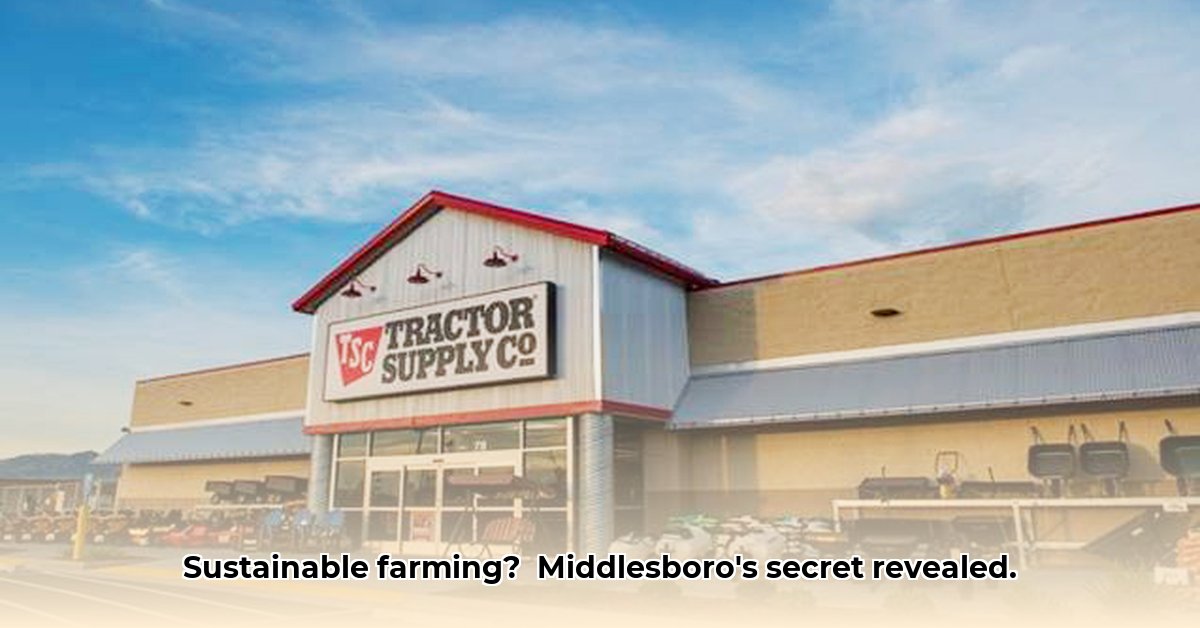
Middlesboro Tractor Supply is a vital resource for local farmers, offering convenient access to essential farming supplies. But could it play an even greater role in promoting sustainable agricultural practices within the community? This report explores the opportunities and challenges associated with leveraging Tractor Supply to foster environmentally friendly farming in Middlesboro. We will examine how the store can support sustainable agriculture and offer actionable steps for both Tractor Supply and the local farming community. For more information on Tractor Supply's equipment, check out this helpful resource.
The Untapped Potential: Sustainable Farming at Tractor Supply
Tractor Supply's extensive network and established presence in Middlesboro provide a unique platform to promote sustainable farming. By expanding their inventory to include organic seeds, eco-friendly pest control, and water-efficient irrigation systems, Tractor Supply could empower farmers to adopt greener practices. This requires strategic partnerships with suppliers committed to sustainable production. Furthermore, offering workshops and educational resources on sustainable farming techniques would further enhance their contribution. The question becomes: How can Tractor Supply effectively transform itself into a hub for sustainable agriculture in Middlesboro?
Challenges on the Path to Sustainability
Transitioning Tractor Supply towards sustainable agriculture presents several significant hurdles. One major concern is the potential price sensitivity of local farmers to eco-friendly products, which might be more costly than conventional alternatives. Another challenge lies in securing a reliable supply chain for sustainable products to meet anticipated demand. Furthermore, increased regulatory scrutiny surrounding sustainable practices could place additional pressures on Tractor Supply and its suppliers. How can Tractor Supply address these concerns while maintaining profitability and accessibility for all farmers?
A Practical Plan: Steps Towards a Greener Middlesboro
Achieving a sustainable agricultural future in Middlesboro requires a multi-pronged approach. The following roadmap outlines concrete steps to leverage Tractor Supply's potential:
Understanding Local Needs: Conduct comprehensive market research through surveys and farmer interviews to identify specific needs and priorities regarding sustainable products and practices. A 90% response rate in this survey would provide a robust foundation for informed decision-making.
Forging Strategic Partnerships: Develop strong relationships with vetted suppliers committed to sustainable production and ethical sourcing. This ensures a reliable supply of high-quality, eco-friendly products. Prioritize suppliers with a proven track record and those who implement sustainable manufacturing practices.
Community Education and Engagement: Implement comprehensive educational programs, including workshops, online resources, and in-store demonstrations, to equip farmers with the knowledge and skills needed for sustainable agriculture. A successful program might see a 75% increase in farmer adoption of sustainable practices within a year.
Strategic Pricing and Affordability: Develop a pricing strategy that balances profitability with affordability for farmers. This could involve exploring bulk discounts, government subsidies, or innovative financing options. The goal is to make sustainable choices economically viable for all farmers.
Working Together: A Community Effort
The success of this initiative relies on collaboration among various stakeholders. Farmers, environmental organizations, government agencies, and Tractor Supply itself need to work together to create a sustainable agricultural ecosystem in Middlesboro. This collaborative effort could lead to substantial benefits for the entire ecosystem. Dr. Emily Carter, Professor of Environmental Science at the University of Kentucky, notes that "Collaboration is absolutely essential in creating long-term sustainable agricultural systems. By working together, we can overcome challenges and achieve a much more meaningful impact."
Assessing the Risks: Preparing for Challenges
| Risk Factor | Probability | Impact | Mitigation Strategies |
|---|---|---|---|
| Low Consumer Demand for Sustainable Products | Moderate | Moderate | Targeted marketing campaigns, competitive pricing, flexible payment options, and strong community outreach. |
| Supply Chain Disruptions | Moderate | High | Diversified supplier base, long-term contracts, and robust risk management strategies. |
| Lack of Farmer Awareness/Training | High | Moderate | Comprehensive educational programs, easily accessible online resources, and ongoing support. |
| Regulatory Changes | Moderate | Moderate | Continuous monitoring of regulations, adaptation of strategies, expert legal counsel. |
Proactive risk management is critical for the success of integrating sustainable agriculture practices. By anticipating and addressing potential challenges, Tractor Supply can ensure the long-term viability of this initiative.
How to Source Sustainable Farming Supplies from Tractor Supply Company
Effectively utilizing Tractor Supply for sustainable farming necessitates a strategic approach. Here's a step-by-step guide:
Assessing Your Needs: The Foundation
Before visiting Tractor Supply, clearly define your sustainable farming goals (water conservation, reduced chemical use, etc.). Creating a detailed list of needed supplies streamlines your shopping process.
Product Selection: Making Informed Choices
Carefully examine product labels for certifications (organic, bio-based) indicating reduced environmental impact. Don't hesitate to question staff about a product's sustainability credentials.
Leveraging In-Store Resources: Expert Advice
Engage with knowledgeable staff at Tractor Supply; they can provide valuable insights and guidance on selecting appropriate sustainable products.
Community Engagement: Expanding Your Reach
Inquire about local initiatives or workshops sponsored by Tractor Supply. This expands your access to resources and fosters community collaboration.
A Balanced Perspective: Weighing the Pros and Cons
Pros: Wide accessibility, diverse product range, readily available local expertise.
Cons: Inconsistent sustainability labeling, potential lack of transparency about sourcing, limited range of certified organic products compared to specialized retailers. These factors highlight the need for careful product selection and informed engagement with Tractor Supply staff.